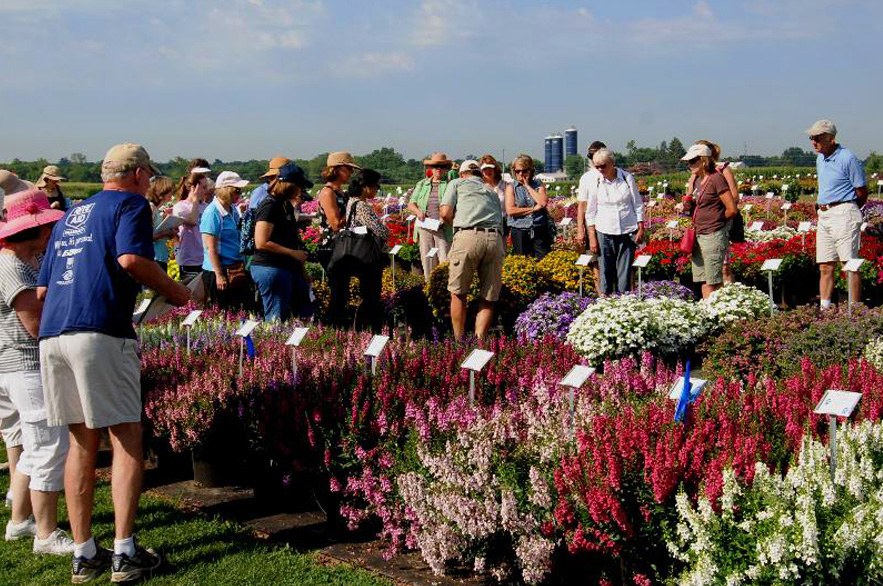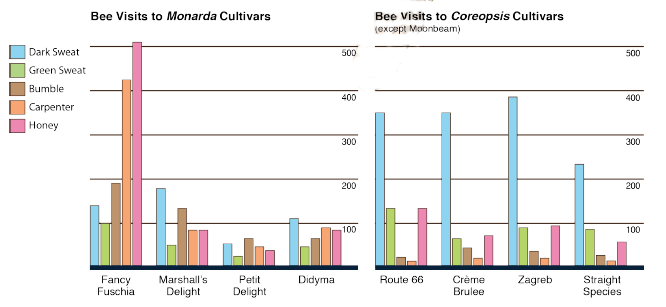The Penn State Extension Master Gardener volunteer program supports the outreach mission of Penn State Extension by utilizing unbiased research-based information to educate the public and our communities on best practices in sustainable horticulture and environmental stewardship.

Master Gardener volunteers develop their horticultural expertise through participation in educational training classes conducted by Penn State faculty and extension staff.
Statewide Highlights
- 2,774 active Penn State Extension Master Gardener volunteers
- 391 newly trained Master Gardeners
- 200,812 volunteer hours reported for a value of $4,819,488
- 197,228 direct adult contacts
- 66,647 direct youth contacts
Master Gardeners Answer Questions
Master Gardeners maintained a Garden Hotline in 52 counties. They reported 16,144 contacts with people who sought this service via telephone, email, or visits to the county office.
Master Gardeners Speak
- 1,380 speaker's bureau talks
- 701 symposia, workshops, and classes
- 157 radio, TV, or Internet spots
Master Gardeners Write
- 742 articles published in newspapers, magazines, or blog
Master Gardeners in the News
- 394 news articles, radio, or TV spots were published about their projects
Master Gardeners Teach
- In 274 schools and 33 youth camps
- Horticulture therapy in 55 special needs communities
- Providing 346 educational displays at county and regional events
- In 132 community gardens
Master Gardeners Partner
- 339 community organizations
Master Gardeners Contribute to the Community
- 37,752 pounds of fresh produce donated to local food banks from Master Gardener-led gardens.
Home Lawn and Garden Newsletter
Penn State Extension Master Gardeners provide information on plant care, insect and disease management, and best practices for home gardeners in the Home Lawn and Garden newsletter, which reaches 12,866 subscribers.
State Programs
SEAREC Flower Trials

Photo by Mark Krotulski
The Master Gardeners support the Penn State Flower Trials at SEAREC (Southeast Agricultural Research and Extension Center), transplanting over 15,000 plugs to 4.5-inch pots to prepare them for potting or planting at the four sites where the trials are displayed. Plants are displayed in containers at SEAREC or planted in the three-year perennial overwintering trials. At the collaborative sites (Hershey Gardens in Dauphin County, Ag Progress Days in Centre County, and North Park in Allegheny County) annuals are planted directly in the ground.
These plants were supplied by 32 companies, both domestic and foreign, who pay for their entries to be evaluated over the growing season. Combined locations of the Penn State Flower Trials attract over 250,000 visitors annually, including 309 people attending Flower Trials Field Day, and 681 at Summer Garden Experience. This year the Penn State Flower Trials, under the leadership of Sinclair Adam, evaluated 931 entries at SEAREC and 60-70 entries at each of the collaborative sites.
During potting week 133 volunteers from regional Master Gardener programs and the Floricultural Advisory Board served the project over a three-day period. Master Gardener volunteers are a key component of this statewide program's success, assisting with production and maintenance over the summer season. Master Gardeners contributed 3,701 volunteer hours to the project during the year.
Fast Facts:
250,000 visitors annually, 3,701 volunteer hours
Poison Prevention

Photo by Cathy Poninsky
Every year in the United States, there are over two million calls to poison centers concerning suspected poisonings or poison substances. As part of National Poison Prevention Week, the Master Gardeners across the state visit first grade classrooms to discuss the dangers of potentially poisonous products and chemicals, and to outline preventative steps people can take to ensure their safety and that of their loved ones. Penn State Extension hopes that these programs presented to the children of Pennsylvania will ultimately reduce the number of people who are involved in poisonings each year, especially poisonings in the home--the most commonly reported poisonings.
Master Gardeners from 27 counties across the state presented the Poison Prevention Program to 452 first grade classes during the months of February and March and reached over 12,345 students. The goal is for children to realize that many chemicals found around the home can be hazardous, including cleaning products, gasoline or other fuels, automotive additives, and others.
Mr. Yuk stickers were provided to the children to take home and apply to chemicals and products that have some level of toxicity indicated by the four signal words: Caution, Warning, Danger-Poison, and Danger.
The program was presented in 187 schools in the Commonwealth. Mrs. Cathy Poninsky, from St. John the Evangelist Regional Catholic School in Fayette County, commented, "The Mr. Yuk Poison Prevention Program is an important addition to any first grade health and safety curriculum. The program provides the students with much needed information, safety tips, and dos and dont's to keep the students safe around the common poisons that they encounter each day. I look forward to the Master Gardeners' presentation each year."
Fast Facts
12,345 first grade students, 452 classes, 187 schools served
Garden Hotline
The Master Gardener Program was started in Washington State in 1972 to aid consumer horticulture educators in answering the hundreds of gardening questions posed by the public. This service continues to be one of the most important outreach efforts of the Master Gardener Program. Homeowners' questions are answered at local Extension offices, via phone and email, and at one of the many Master Gardener outreach events held across the state.
Master Gardeners answered over 16,144 gardening questions during the 2016- 2017 reporting year.
Results from the follow-up survey that was shared with homeowners are as follows:
93 percent of the respondents rated the customer service provided by the Master Gardeners as very good to excellent.
93 percent rated the ability of the Master Gardeners to find information or an answer to their question as very good to excellent.
92 percent of the respondents found the information to be very good to excellent.
"It was an absolute pleasure to interact with all of the Master Gardeners. If they don't have the answer, they offer to research it. . . . Thanks so much for the excellent advice received over several years. I have been exceptionally pleased."
"Thank you, Penn State Extension, for continuing to exist! What a useful service that most people, even gardeners, don't take advantage of."
Of the 239 respondents who changed a practice that resulted in a cost savings:
- 46 percent avoided purchasing the wrong pest management remedy.
- 26 percent saved a sick plant and now it is doing better.
- 16 percent used a lower cost cultural or mechanical method for managing the pest.
- 12 percent replaced the plant with one that is better suited for the site conditions.
Fast Facts
16,144 questions answered, 476 Master Gardeners participated, 15,949 volunteer hours contributed
| Question Categories | Total Number of Questions per category |
|---|---|
| Disease questions or samples processed in-house | 2,559 |
| Disease samples sent to University Plant Disease Clinic | 308 |
| Garden planning/plant selection/plant propagation | 1,300 |
| Insect (indoor) questions or samples processed at the office | 667 |
| Insect (indoor) samples sent to the University for ID | 86 |
| Insect (outdoor) questions or samples processed at the office | 2,209 |
| Insect (outdoor) samples sent to the University for ID | 90 |
| Weed and invasive ID and management | 939 |
| Plant ID | 1,376 |
| Referrals/upcoming events/ Master Gardener Program | 788 |
| Site/weather-related or cultural problem | 1,019 |
| Soil health (soil testing, composting, mulching) | 1,343 |
| Plant culture, care, and pruning (includes turfgrass) | 2,424 |
| Wildlife/animals | 557 |
"The Master Gardener was friendly, knowledgeable, and extremely helpful. I had not known about the extension offices and services prior to this problem, but will definitely be recommending using your services and expertise in the future. Thanks very much for sharing your time and expertise."
Pollinators
Pollinator Preferences
As our Pollinator Preferences sign states, not all plants are alike when it comes to providing bees with the pollen and nectar they need. Some hybrids and cultivars selected for their ornamental traits may have diminished value for pollinators.
The goal of the Penn State Extension Master Gardener Pollinator Preference Program is to gather data on the attractiveness of various floral resources to our native bees and honey bees. From 2012 to 2015 Master Gardeners across the state monitored three different sets of plants weekly for pollinator visitation. The success of that monitoring led to the current program where we are evaluating the attractiveness of three different Monarda and Coreopsis cultivars. Master Gardeners in 31 counties across the state are participating. 2017 marked the second year of the three-year program. An additional monitoring program is evaluating powdery mildew susceptibility of the Monarda cultivars.
Pollinator Preferences has also caught the attention of several other states, which have asked for information on starting their own monitoring programs.

Pollinator-Friendly Garden Certification Program
The Master Gardener statewide Pollinator-Friendly Garden Certification Program, now in its sixth year, has certified over 741 gardens in 57 counties. The gardens range in size from very small urban plots to large public gardens.
Started in 2011 to educate home gardeners about how they can provide safe havens for pollinators, the certification program focuses on creating landscapes that strengthen and increase native pollinator populations. Residents are encouraged to use the Pollinator Certification website to learn how to create pollinator-friendly landscapes. They then submit an application to have their gardens certified. Qualifying gardens can display the attractive Pollinator-Friendly Garden sign.
The program has received attention from Master Gardener programs across the country. Nebraska Extension recently created a certification program using our template and has already certified 50 gardens.
More information can be found by going to the Pollinator Garden Certification link on the Penn State Center for Pollinator Research website.
Fast Facts
741 certified gardens in 57 counties

